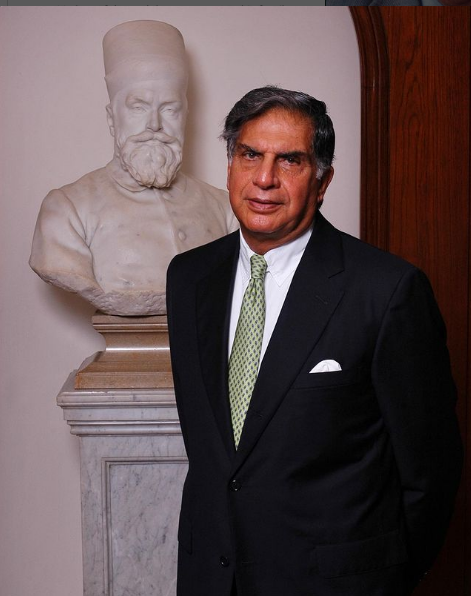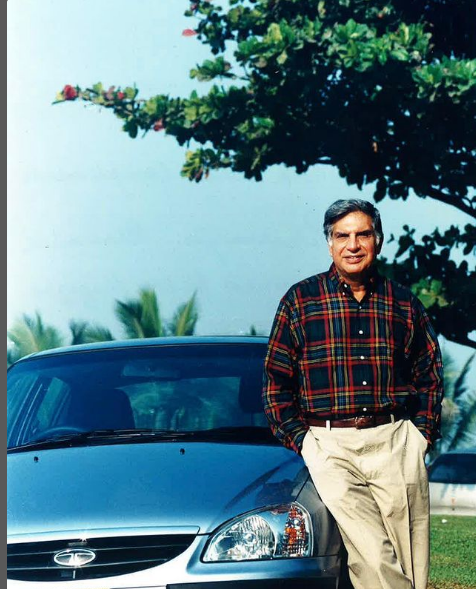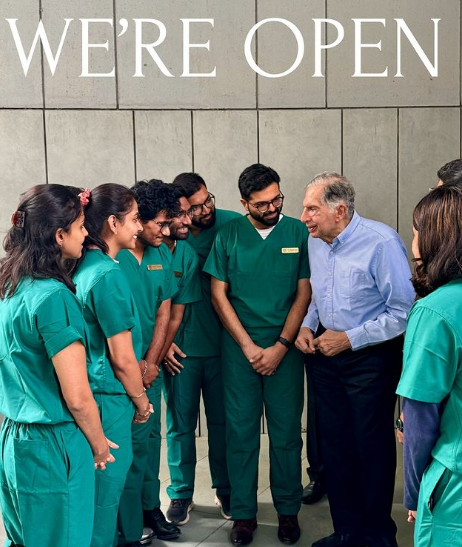Ratan Tata born on December 28, 1937, in Mumbai is an Indian businessman and an ex-chairman of Tata Sons company. He served Tata group as chairman for the company from the year 1990 to 2012 and was an interim chairman from October 2016 to February 2017. He is philanthropic and handles the companies’ charitable trust, besides which, over fifty percent of the profits are given for charity.
Ratan Tata belongs to one of the premier families of India. He is the great-grandson of Tata’s, founder of Tata Group; most of his childhood and youth were spent in family with strong educational and serving background. He passed out from Cathedral and John Connon School, Mumbai, and went on to study architecture at Cornell University and complete an advanced management program at Harvard Business School.
Mr. Tata was appointed to the Tata Group in 1962 when he joined Tata Steel; he worked as a production employee starting on the factory floor. This enabled him to learn the environment and the difficulties that the industry faces in a very practical way. Ratan Tata in 1991 became the chairman and chief of Tata sons replacing the earlier incumbent J.R.D Tata. During his rule which ended in 2012, he oversaw a tremendous growth and internationalization of the Tata Group.
Tata Group saw a major change under the chairman ship of Ratan Tata. He played a great role in the process of changing the orientation of the group’s activities and the development of a new profile of its presence in the world. He decided as many times, which can be considered one of his significant successes, to buy Jaguar and Land Rover, British manufacturers of luxurious cars, in 2008. Besides reviving the brands this strategic move benefited Tata in establishing a global identity of its reputation.
Ratan Tata also played his part in the world’s cheapest car the Tata Nano designed to meet the needs of the average consumer.
There has been a great transformation that Tata group has experienced under the management of Ratan Tata. He was more important in changing the direction of the companies and taking the group international. One on his major milestones was the acquisition of the British based luxury car manufacturers; Jaguar and Land Rover back in 2008. Not only did this strategy bring the brands back to life but also helped build a better image for Tata on the international forum.
Ratan Tata also launched the nano, the small car for the masses. Despite the problems that were observed in the course of the project, it turned out that Tata really cares about innovation and social issues. He always anticipated in bringing products that could positively impact the lives of the average populace.
Like business, Ratan Tata has been an icon for corporate social responsibility across the globe. He underlined the issue of ethical business and corporate charity for the needy in the community. Tata Group also keen to involve in socially responsible activities like Education, Health Care and Rural Development Activities. During his leadership, the group that was under him, set many projects towards the betterment of needy societies.


Ratan Tata is more of a humble man and yet very visionary. He has usually been characterized as a quite assertive but unwavering type of the leader who pays much attention to the development of interpersonal relations. His leadership style shares both the past and the present hence happy to inform you that he is flexible to adapt to changes in the market.
Ratan Tata Biography 2024
| Born | Ratan Naval Tata 28 December 1937 Bombay, Bombay Province, British India (now Mumbai, Maharashtra, India) |
| Died | 9 October 2024 (aged 86) Breach Candy Hospital, Mumbai, Maharashtra, India |
| Education | Cornell University (BArch) |
| Occupation | Industrialist Philanthropist |
| Father | Naval Tata |
| Age | 86 Years |
| Successor | Cyrus Mistry (2012–2016) Natarajan Chandrasekaran (2017–present) |
| Relatives | Tata Group |
| Awards | Padma Vibhushan (2008) Maharashtra Bhushan (2006) Padma Bhushan (2000) |
| Net Worth | ₹3,800 crore (Approx..) |
Ratan Tata Career Life
Ratan Tata has made a dramatic impact on Tata organization and business in general throughout India during his career. His life combines the best of tradition and innovation, managerial thinking, and the focus on social justice.
Early Career
This gave him a superb opportunity to grasp the most minute of details of the line of business and the operations. Throughout the years he served in various capacities of the group thus gaining cross-sector experience of many industries.
Leadership at Tata Group
Though born in Ireland, he moved to India, in 1930 and took charge of Tata Group holding company Tata Sons as the chairman in 1991 replacing JRD Tata. His tenure, which lasted until 2012, was transformative:
Global Expansion
The globalization of the group was excessively spearheaded by Ratan Tata especially in different fields. Some of the major acquisitions were Jaguar and Land Rover for instance in 2008, which place Tata motors on the global map.
Diversification
During his tenure as the head of this group, Tata ventured into new focuses areas that include information technology through establishment of Tata Consultancy Services (TCS), consumer and telecommunication services. This diversification helped to further tighten up the group’s defensive armor in relation to its market position.
Innovation:
Ratan Tata although praised for incremental upgrades, advocated innovation, The Tata nano 2008 for instance, an instant classic meant to be an affordable people’s car. Despite this, the project was an example of his dream of an inclusive Information Technology environment.
Corporate Social Responsibility:
Ratan Tata spoke a lot about Business ethics and social responsibility of business. The Tata Group has taken numerous social responsibilities towards society with reporting nearly 60% of total contribution to economical development inclusive of education, healthcare and supporting rural development through Tata trusts.
Mentorship and Investment:
He has financed many new business ventures, mainly involving technology and has sponsored many young entrepreneurs. Hear introduces himself as an M.P for Clwyd South with strong interests in business specially entrepreneurship since he vouches for new initiatives to spur the economy.
Also Read Bollywood And Hollywood Biography
Ratan Tata Struggle Life
This paper highlights the major challenges and struggles in Ratan Tata’s life and accomplishments in his carrier. They are not only helpful with person’s character but also can be beneficial with leadership and philanthropic activities.


Early Challenges
Family Background: Ratan Tata was born in the Tata family, however, his childhood was not absolutely easy-life. Tata had some severe opposition from the heads of diverse subsidiary companies which, under senior Tata’s management, was granted a significant level of autonomy. As a result, Tata put in many polices to reduce decentralize its authorities like retirement age, Subsidiaries reporting to group office and Subsidiary profits for building up Tata group brand.
Education
Ratan was subjected to competing with the achieved demographics of his family. He continued his education in architecture at Cornell University and further on even went to Harvard Business School. While growing relatively ‘closer to nature’, and then shifting to a western schooling system, he has been subject to different cultures.
Professional Struggles
Joining the Tata Group: Ratan Tata commenced his career at Tata strongly in 1962 and worked in the Indian steel plant. This practical exercise was a deviation from the culture expected of him, whereby he expected to be promoted up the ladder because he was a prince. He had to struggle to gain credibility from some sections merely because they expected him to work hard and deliver a lot.
Chairmanship Transition
When Ratan Tata assumed the chairmanship of Tata Sons in September 1991 he took charge of a group, which needed a considerable boost. The economy of India was in a liberalization process and the Tata group was under a lot of competitive pressure. He was left in these stormy waters, having to make strategic changes to the organizational culture and processes of the company and at the same time staying loyal to the core values of the firm.
Acquisition Challenges
However, it is a fact that the Jaguar Land Rover deal made in 2008 was more or less a risky venture. The brands were in poor financial health and to make matters worse Ratan Tata was criticised by Industry experts. But his vision and determination to transform the brands’ fortunes proved to be a success and one of the strengths here.
Personal Struggles
Public Scrutiny: There are many pressures that Ratan Tata has encountered in his business career his position in a highly placed Indian company implying that he is under public scrutiny. Some decisions he made were criticized but he kept his priority on goals and aspirations of the company.
Health Issues
Ratan Tata has faced personal health issues and a major one involved an accident that happened in the early part of this decade. This experience helped to strengthen his determination to concentrate only on important things in his life – work, and charity.
Commitment to Social Causes
Nevertheless, Ratan Tata has continued to take corporate social responsibility seriously. He set up programs through the Tata Trusts that are in education, health and rural infrastructure development because he wanted and expected his businesses to give back to society.
Ratan Tata Personal Life and Death
By the time of his death, Tata had never been married and there were no children left behind. In 2011, he said, I have come close to getting married four different times and each of the four times I have backed off in one or the other.
Tata was in a very serious condition and has been on Intensive Care since 7 10 2024. He passed away on the night of 9th October in 2024 at Mumbai’s Breach Candy Hospital, at the age of 86.
Ratan Tata Business And Tata group


It was this leadership which steered the group towards innovation, growth and a rich social responsibility culture.
Leadership at Tata Group Chairmanship
Ratan Tata being the chairman of Tata Sons started in 1991 and he up to 2012. While heading the group, he was able to bring major changes in the group in order to respond the dynamic changes that occurred in the economy of India and globally.
Global Expansion Ratan Tata was responsible for their globalization of the group. Notable acquisitions include
Jaguar Land Rover
This was acquired in the financial year 2008 and brought in the luxury car segment of the automotive business for Tata. Corus Group: Tata Steel also Buy Corus in 2007 to increase its benchmark as the sixth largest steel company of the global steel industry. Diversification: Mr. Ratan Tata built the group outreach to various fields, these are:
Information Technology
Tata Consultancy Services (TCS) was transformed into a premier IT services company during his tenure.The management of SCD came under the ownership of TCS in 2000s and he did a great job in this period.
Tata Trusts
The trusts support diverse social initiatives in education, healthcare as well as the development of rural areas – as per the vision of the founder of the group, Jamsetji Tata. Philanthropic Efforts: During his tenure, the group strongly supported the enhancement of healthcare infrastructure, school, and disaster rebuilding.
Ratan Tata Net Worth 2024
There is still a long list of successful billionaires and he was one of them Ratan Tata, the industrialist and philanthropist of 2024 has ₹3,800 crores as his net worth. He is still involved with Tata Sons however majority of it goes towards financing charitable activities. He has given his most efficient contributions in the field of education, healthcare, and rural development sectors, which have evident social causes.
Ratan Tata Social Media
Insatgram – https://www.instagram.com/ratantata/?hl=en
X – https://x.com/RNTata2000?ref_src=twsrc%5Egoogle%7Ctwcamp%5Eserp%7Ctwgr%5Eauthor
Also Visit Home Page
